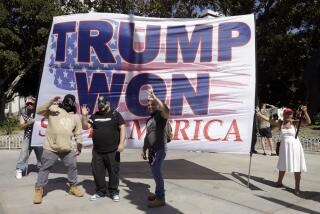NEWS ANALYSIS : Yugoslavs Face Complex Choice in Dec. 20 Vote : Politics: A ballot for peace may raise risk of Serbian civil war by driving power-hungry Milosevic to desperate extremes.
BELGRADE, Yugoslavia — Federal Prime Minister Milan Panic and Serbian President Slobodan Milosevic moved their political showdown onto the campaign trail Saturday with the announcement that federal and republic elections will be held Dec. 20.
The vote will offer the people of Yugoslavia a clear choice between peace and reconciliation with Europe or irrevocable condemnation as an outlaw state.
But in keeping with the complexities that have made Balkan politics a dangerous and unpredictable pursuit, a vote for the peaceful option may actually intensify the risk of a Serbian civil war by driving the power-hungry Milosevic to desperate extremes.
The Serbian strongman has already demonstrated his willingness to break the law to remain in power, as evidenced by his recent armed takeover of the federal Interior Ministry.
Milosevic, who was elected to a five-year term as Serbian president less than two years ago, appears to have given in to Panic’s demand for early elections after calculating that opposition to his authoritarian rule is growing and the longer he delays a vote the more difficult it will be to win.
Support for the Serbian leader has steadily eroded in recent months, as his backing of militant nationalists in Croatia and Bosnia-Herzegovina is widely seen as the cause of ethnic wars that have devastated both republics and killed at least 24,000 people.
“He needs the legitimacy of another election victory, and he’s convinced he has a better chance to win now than later,” said Dragoljub Micunovic of the opposition Democratic Party.
In a short speech to a weekend congress of his Serbian Socialist Party, Milosevic struck a confident pose and appealed to fellow Serbs to unite behind him to defeat rivals he portrays as the lackeys of Western powers.
Western diplomats say they fear the election will be biased in favor of Milosevic as he continues to control the most influential mass media, as well as tens of thousands of police, paramilitary troops and some units of the federal army.
If Milosevic and his allies were defeated, many fear he would set off a diversionary crisis or stage an outright coup to remain in power.
Fighting continues to rage in Bosnia-Herzegovina as Serbian rebels seek to conquer as much of the republic as possible in advance of a negotiated division of the disputed territory among the combatants. Ethnic conflict is also threatening to flare in the Serbian province of Kosovo, where an Albanian majority is subject to repression and abuse by heavily armed Serbian troops loyal to Milosevic.
Many people in Serbia have become weary of the conflicts and resentful of social hardships resulting from the Belgrade government’s massive outlays to fuel the war machine. Inflation has been galloping at an unfathomable six-digit pace, and most industry has been idled by lack of fuel, material and money.
Panic, who left his California pharmaceuticals empire in July to take on the daunting task of rescuing his Yugoslav homeland, has sought to channel that disaffection into a campaign for change and peaceful solutions.
But questions have been raised about whether Panic can contain the volatile crisis in Yugoslavia for another two months, especially in view of the federal government’s inability to recover the Interior Ministry from Milosevic gunmen.
In his battle to depose Milosevic and restore Yugoslavia to the international community, Panic has won the support of Serbian Orthodox Church leaders, artists and intellectuals, opposition figures and Yugoslav President Dobrica Cosic, whose nationalist writings were the inspiration for Milosevic’s rallying cry of uniting all Serbs in one country.
At a press conference Saturday to review his first 100 days in office, Panic gave himself a sterling report card, claiming credit for everything from the U.N. airlift of humanitarian aid to Sarajevo to the few advances made by Western negotiators brokering peace talks in Geneva.
Panic parried suggestions that he holds no real power with jokes and masterful application of spin control.
He waved off the loss of the Interior Ministry as “a hiccup in democracy” and, when asked if the federal army was behind him, replied that the armed forces “are in front of me.”
Panic also dismissed his country’s expulsion from the U.N. General Assembly this fall as a temporary setback and insisted that Yugoslavia--now consisting of just Serbia and its small ally, Montenegro--is “a technically recognized country,” despite the absence of formal ties with any significant Western nation.
But because he has fallen woefully short of his promise to bring peace to Yugoslavia within 100 days, many here fear Panic’s skill at creating the illusion that he is in command will not hold up until the election.
“A lot of people are already shouting that the emperor has no clothes,” one Western diplomat said. “Panic and Cosic may have their hearts in the right place, but if they don’t have any real power they are not going to be able to keep this crisis from spreading.”
The Serbian takeover of the federal Interior Ministry served little purpose except to remind the Yugoslav people who holds the real power.
More to Read
Sign up for Essential California
The most important California stories and recommendations in your inbox every morning.
You may occasionally receive promotional content from the Los Angeles Times.











